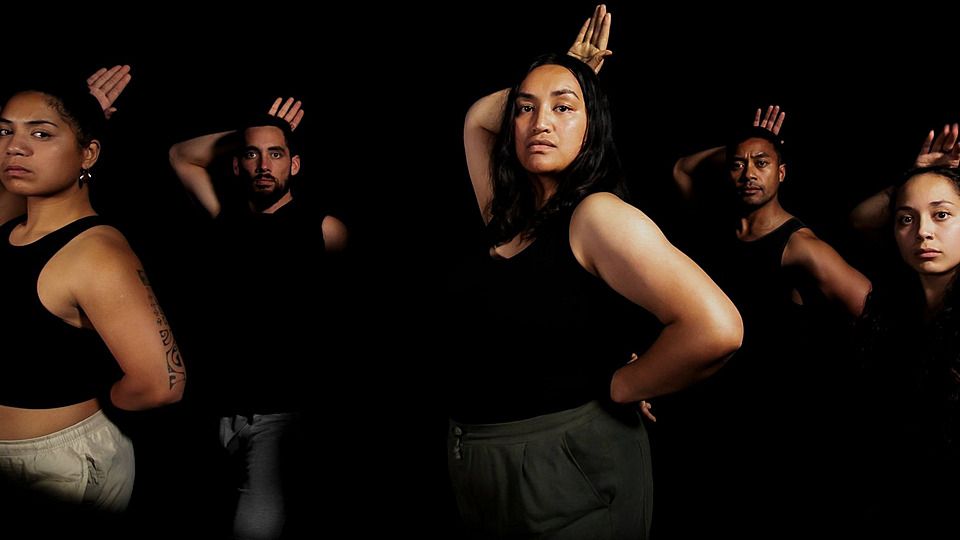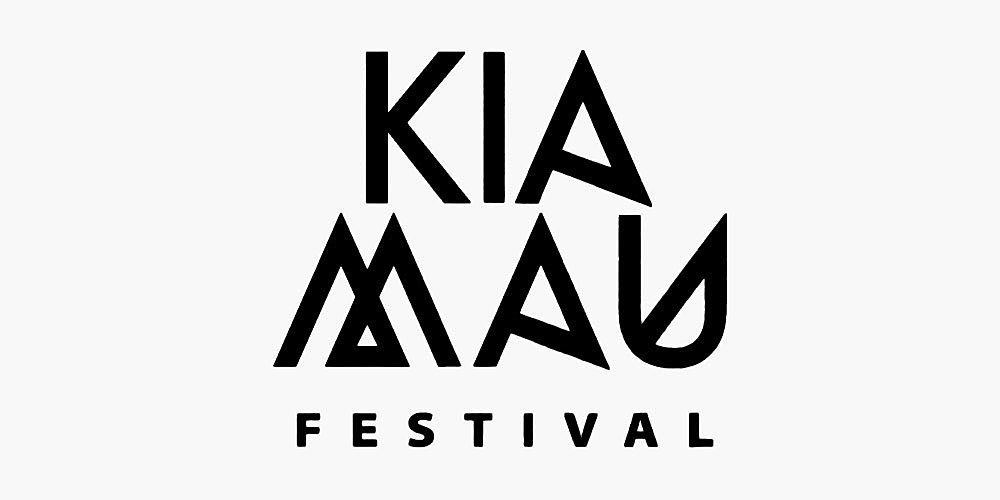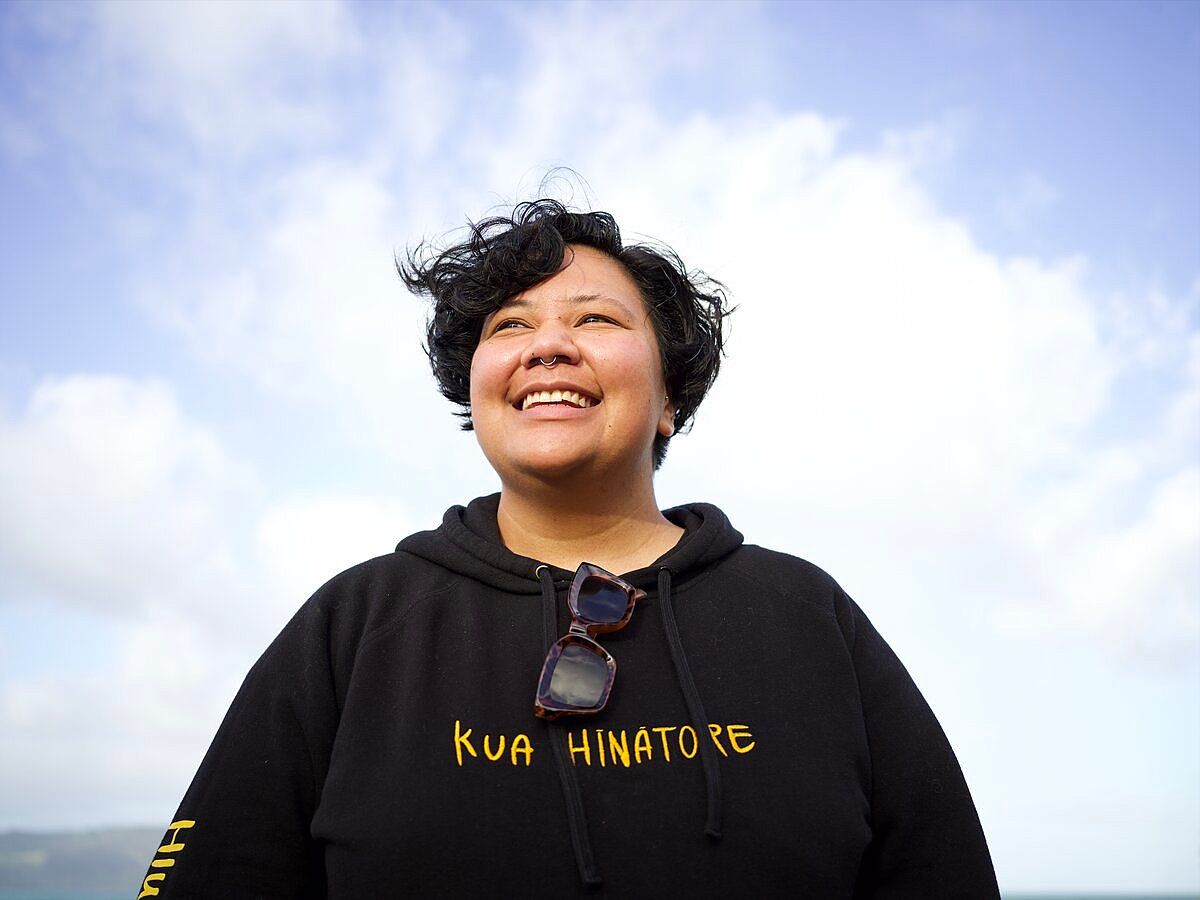The Rongoā I Didn't Know I Needed: A Review of Neke
Alesha Ahdar heals childhood understandings of te ao wairua through the vibrant display of mana motuhake that is Neke by Scotty Cotter.
When we walked into the theatre at Te Auaha, the stage was set with tall artworks bearing the names of atua Māori. Tāwhirimātea, Mahuika and Hineahuone were just a few. For me, this was the beginning of all beginnings, our atua. The room went dark, and we experienced a representation of pōwhiri, in which branches were laid down. It brought to mind the whakataukī, Kua takoto te mānuka, the challenge has been set. Dressed in black, the performers embodied the movements of pīwaiwaka and sea creatures, and their singing pierced through the physical world all the way into te ao wairua.
I’ll never forget the taniwha we met at Neke. Manifested by the movement of a performer, the taniwha glided through the water and basked in the light. They had the biggest smile, were gentle, and happy to see us. The taniwha was deaf and expressed everything to us in sign, facial expression, movement and mouthing words. They played Rock, Paper, Scissors with one audience member and made all of us feel like their friend.
I grew up a little Māori girl who saw the Waikato River every day. Older kids had told me scary stories about taniwha in the river, and I was scared to go near it. The call of the karanga frightened me, and I was afraid of our kuia who were kaikaranga. I’d been told scary stories of whakairo, and the sound of the pūrerehua spooked me.
The concept of ‘good taniwha’ is new to me, and even though I’ve grown up and I’m not scared of te ao wairua anymore, the Māori girl within me needed to meet this kind and friendly taniwha. We were visited by the taniwha throughout Neke, and they shared with us through sign and mouthing words, saying a few things I didn’t know I needed to hear. You are on the right path. You have a big heart. You are beautiful. Remember. I know it sounds really simple, but I imagine every Māori person in that audience needed to hear that. You are on the right path.
When you think about your tūpuna, how do you imagine them?
This is my first year studying te reo Māori me ōna tikanga in a full immersion space. The day before seeing Neke, the thought of dropping out of wānanga had popped into my mind in a moment of insecurity. As I sat in the theatre, I wondered if the show's creators had somehow been listening to the conversations I'd been having with my tūpuna. You are on the right path. Hearing that was the rongoā I didn't know I needed. Whilst reflecting on this after the show, I thought of a whakataukī I’d learnt at wānanga a few weeks ago: He oranga ngākau, he pikinga waiora. Positive feelings within you enhance wellbeing.
At one point, our taniwha friend was floating, arms and legs swaying side to side as if being carried by a gentle river tide, in front of an image of a tūpuna wall. At the back of many wharenui, a tūpuna wall is hung with portraits of people who have passed away, who also whakapapa to that marae. You are on the right path. Remember.
When you think about your tūpuna, how do you imagine them? I used to think of mine as mystical ghosts who, for the most part, were serious and scary. Since I began my reo journey, my mindset has changed to something similar to what we saw in Neke. Now I see my tūpuna as passionate whānau members on the sidelines of the rugby match that is my life. I imagine them cheering me on, “Come on, moko! Go, my moko! Yes, that's the one! Go! Go! Yeeehuuu!”
I have a specific theory about one of my great kuia who has now passed. Ko Te Ruahuihui (Renati) Macpherson tōna ingoa. He uri ia o Tapuika ratou ko Ngāti Whakaue, Tūhourangi, me Ngāti Moko. She was the mother of my koro Michael. I imagine her as the ultimate schemer of all of my ancestors, and I believe she has a way of making sure I’m at the right place at the right time.
It was refreshing to see a show where I felt like its creators considered what Māori needed to see
Another rongoā I didn't know I needed was the characters in Neke,particularly in the noho marae scene. I felt like I knew all of them in real life and that, in some way, I was them, and they were all me. The wahine on her first day of her full immersion te reo Māori journey, the seemingly tough aunty, the ‘corporate’ wahine attending her first noho marae, the happy-go-lucky tāne who could be perceived as lacking depth or intelligence but was actually teaching us all. The moment came for karakia, and the lights dipped, and we were privy to their thoughts. The corporate wahine spoke of being nervous – and brought forth similar kōrero to that I’ve had with friends, about urbanisation and being ‘Māori enough’. There are so many layers to this, and so many layers to Māori people. We’re not all the same. There are so many ways to connect to your Māoritanga, and however you do it, your tūpuna are on the sidelines cheering you on. Whāia te iti kahurangi, seek that which is most precious.
It was refreshing to see a show where I felt like its creators considered what Māori needed to see. What Māori needed to hear. My mauri needed to hear these waiata and haka. I needed to meet these characters who invalidated every feeling of insecurity I’ve had through navigating my journey to connecting with te ao Māori. The show ended with a haka. A haka to encourage us and to encourage the revitalisation of te reo Māori. I was astounded by the way each performer moved and used their voice to challenge us, to mihi to us, and to uplift us. I also felt this sense of Ah yes, that’s our people, and left the show feeling deeply proud to be Māori.
Nui ake te mihi ki a Scotty Cotter rātou ko Shania Bailey-Edmonds, Moana Ete, Te Hau Winitana, Reuben Butler, Dominic Ona-Ariki, Tracey Tawhiao, Braedyn Togi, Marg Goldsmith, Neke Collective and Kia Mau Festival. Poipoia te kākano, kia puawai.
Scotty Cotter’s upcoming work is Mauri Tau.
*
This piece is presented as part of a partnership with Kia Mau Festival. They cover the costs of paying our writers, while we retain all editorial control.


